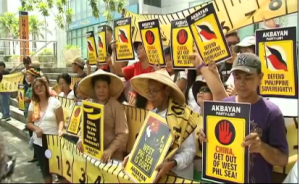
(Reuters) — Dozens of Filipino activists rallied at a demonstration outside the Chinese embassy in Manila’s business district on Wednesday (April 2) to protest China’s recent blockade attempt of a vessel in the South China Sea.
Two Chinese coastguards tried to block a Philippine civilian vessel delivering food, water and fresh troops to Second Thomas Shoal on Saturday (March 29),
The shoal is known in China as Ren’ai reef and in the Philippines as Ayungin.
Protesters in Manila condemned the blockade attempt, citing the Philippines’ claim over the disputed shoal.
Akbayan Partylist Congressman Barry Gutierrez said China should resolve the dispute through international arbitration.
“We want to remind the Chinese officials that this is an issue, this is a controversy that can be resolved by law. It can be resolved through a very, very orderly process. After all, both China and the Republic of the Philippines are in signatory parties to the UN Convention on the Law of the Sea, so let that treaty prevail, let the provisions of international law decide,” he said.
The Philippines has filed its arbitration case before the United Nations against China on Sunday (March 30) over a maritime territorial dispute in the South China Sea, challengingChina’s “nine-dash-line” that stretches deep into the South China Sea and the maritime heart of Southeast Asia.
China has rejected the arbitration case and accused the Philippines for deliberately heightening tensions.
China displays its claims to the South China Sea on official maps with a so-called nine-dash line that stretches deep into the maritime heart of Southeast Asia.
Vietnam, Malaysia, Brunei and Taiwan also have claims to parts of the potentially energy-rich waters.






